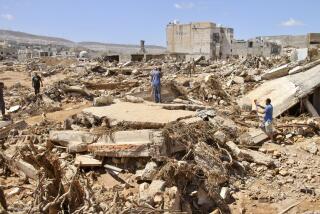Libyan oil situation uncertain
- Share via
We’re still a long way from cheap gasoline, but oil prices were roiled considerably Monday by news of the rebel advances in the Libyan capital of Tripoli, with prices in London falling sharply at one point.
Global oil prices rocketed in mid-February, when violence ripped through Libya, the first major oil producing country to experience the turmoil of the so-called Arab Spring.
Libya produced about 1.8 million barrels a day before the civil war, and exported nearly all of it, mostly to Europe. The foreign companies that helped run the Libyan petroleum industry shut down their fields before fleeing the country, reducing oil production to a trickle and all but ending exports to a global market that, at the time, demanded more oil because of the nascent economic recovery.
High oil prices have been falling lately as the recovery has slowed, and they dipped even more sharply on the news of rebel advances in Tripoli, with expectations that production and exports would resume soon.
Industry experts cautioned, however, that it was too soon to tell how quickly Libyan oil exports would rebound. Few at this point know for certain if the oil reservoirs were damaged by the rapid shutdown of production as violence swept through the country in the winter. It is also unclear if the country’s pipelines and refineries were hurt.
Moammar Kadafi’s allies promised to destroy the oil infrastructure, but little of that seems to have occurred. Even if the fields and infrastructure are in relatively good condition, bringing them back to normal production levels will take time.
Some experts predict that Libya might be able to pump about 1 million barrels a day in a few months. Libya’s former top oil official, Shukri Ghanem, told Reuters in London that it might take up to 18 months to reach pre-war production levels.
Still, foreign oil companies have begun to consider the possibility of some workers returning to Libya. The rebel government itself formed its own oil company, and unlike, say, Iraq, after the American invasion, the Libyans have the bureaucrats, engineers and workers in place to bring their industry back on line.
neela.banerjee@latimes.com
More to Read
Get the L.A. Times Politics newsletter
Deeply reported insights into legislation, politics and policy from Sacramento, Washington and beyond. In your inbox twice per week.
You may occasionally receive promotional content from the Los Angeles Times.











